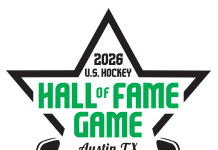Conferences will have more options for overtimes and hand passes will be illegal in all zones starting in the 2012-13 NCAA hockey season.
Those were among the decisions made by the NCAA Ice Hockey Rules Committee when it met Wednesday and Thursday in Indianapolis.
Meanwhile, the committee did not forward a proposal to allow players to wear three-quarter visors and instead turned its attention toward reviewing safety technology.
Rule changes are subject to approval by the NCAA’s Playing Rules Oversight Panel, which meets in July. They include:
• An option for conferences to use a four-on-four system for the five-minute overtime period in regular season games.
“There was some support in the membership for four-on-four overtime, and it is an exciting brand of hockey,” outgoing committee chair Ed McLaughlin, the athletic director at Niagara, said in a statement. “We also wanted to respect the membership views that it might not be the best for all levels of hockey right now. Providing an option for everyone is the right step for us.”
Shootouts after the five-minute overtime period remain one of the options available to conferences.
• Eliminating the ability for a player to pass the puck with his or her hand in the defensive zone.
The change makes the hand pass rule consistent throughout the ice. A hand pass now will result in a defensive-zone faceoff for the offending team, and if the violation takes place in the defensive zone, the team will not be able to change lines.
• Changing the requirement that the goal must be down on its pegs when the puck crosses the goal line for a goal to count.
The referee will be given the leeway to determine whether the puck would have entered the net in its normal position when a defensive player knocks the net off its pegs.
When Michigan State played Union in the 2012 NCAA men’s regionals, an apparent Spartans goal was reviewed and disallowed when the officials determined the net, as the puck entered, was slightly raised off its pegs by a Union defender. That goal likely would be allowed under the new rule.
“Our rules currently don’t allow for much leeway, and we believe we have disallowed too many goals that really should count,” McLaughlin said. “The NHL rules have been used effectively, and we believe this is a positive change.”
• Allowing goals that enter the net off skates except when they are directed using a distinct kicking motion.
That rule pulls college hockey in line with the NHL. In the last two-year NCAA rule book, a goal was disallowed if it was kicked or directed with the skate.
“We ultimately believe bringing some clarity to this rule is important and allowing goals that are directed into the goal with a skate will be a positive move,” McLaughlin said. “It seems like the hockey community is comfortable with the concept of a distinct kicking motion, so we hope this brings some clarity to this rule as well.”
• Mandating the two-referee, two-linesman officiating system for men’s hockey at both the Division I and Division III levels while leaving an option for a two-referee, one-linesman system for the women’s game.
• Making goal judges recommended instead of required.
• Allowing for postgame video review of game disqualification penalties.
The committee has asked for help from the conferences in determining what procedure and guidelines officials should use.
Shields get more review
The rule that since 1978 has required players to wear a full face shield has been targeted for change in recent rules discussions, with the men’s coaching community coming out in favor of visors.
The development of a three-quarter visor appeared to appeal to the committee, but it did not include a rule change concerning facial protection in its proposal.
Instead, the committee plans to meet with the NCAA’s competitive-safeguards committee and form a larger package of safety improvements to go along with the introduction of visors.
The NCAA cited a survey of 1,000 college hockey players that showed 83 percent would prefer the three-quarter visor to a full shield if given the choice.
Many of them have worn half-shields in the USHL or other junior leagues before playing college hockey. The NCAA plans to compare its injury data with that of the USHL, which has compiled information on facial injuries and concussions on players in their first year wearing a visor.
The hurdle may be to convince the NCAA’s safeguards committee that removing protection will make for a safer experience for players.
“Our coaches and student-athletes feel the game will be played with more respect, and players will play with less of a sense of invincibility,” McLaughlin said. “We’ve talked about the visors, but also about softer padding in general as another important part of this.”
The committee also named Michigan State coach Tom Anastos the new chair, effective Sept. 1.


